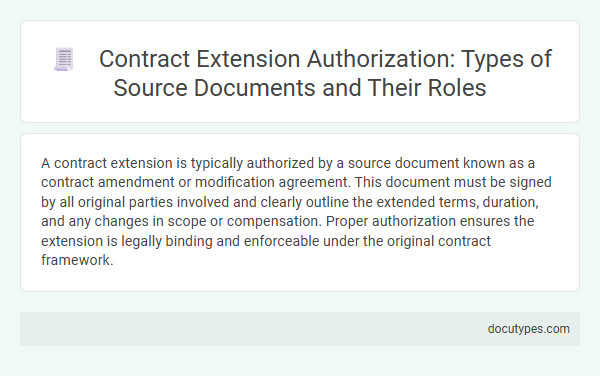A contract extension is typically authorized by a source document known as a contract amendment or modification agreement. This document must be signed by all original parties involved and clearly outline the extended terms, duration, and any changes in scope or compensation. Proper authorization ensures the extension is legally binding and enforceable under the original contract framework.
Introduction to Contract Extension Authorization
Contract extensions require formal authorization to ensure legality and mutual agreement between parties. Identifying the correct source document is essential for validating the extension process.
- Contract Amendment - A formal document that modifies the original contract terms and authorizes the extension period.
- Change Order - An official directive used in project-based contracts to officially approve additional time or scope changes.
- Extension Letter - A written agreement signed by all parties to extend the contract duration without altering other terms.
Selecting the appropriate source document guarantees compliance and enforces the validity of the contract extension.
Overview of Source Documents in Contract Extension
Source documents that authorize a contract extension typically include contract amendment forms, formal extension agreements, and written consent from all involved parties. These documents outline the terms, duration, and any modifications agreed upon to continue the contractual relationship. Proper authorization through these sources ensures legal validity and clarity in extending the original contract.
Types of Source Documents Used in Contract Extensions
Understanding the types of source documents that authorize a contract extension is crucial for maintaining legal and operational clarity. These documents provide the necessary authorization to extend contract terms beyond the original agreement.
- Amendment Agreement - This formal document modifies the original contract terms, explicitly authorizing the extension period.
- Change Order - Used primarily in construction and service contracts, it serves to approve changes including extensions to the project timeline.
- Letter of Extension - A written confirmation, often less formal, that grants permission to extend the contract duration.
Role of the Original Contract in Extension Authorization
The original contract serves as the primary source document authorizing a contract extension. It outlines the terms and conditions under which extensions can be granted, including duration, scope, and approval processes. Contract amendments or modification agreements based on the original contract formalize the extension authorization.
Importance of Amendment Agreements
A contract extension is typically authorized by an amendment agreement, which serves as the official source document. This document outlines the agreed changes, including extended terms and revised conditions, ensuring legal compliance and clarity.
Amendment agreements are crucial because they provide a formal record that protects the rights and obligations of all parties involved. You must ensure this document is properly executed to avoid disputes and maintain the contract's validity throughout the extension period.
Supplementary Letters and Memos as Source Documents
Supplementary letters and memos serve as formal source documents that authorize contract extensions by providing official written confirmation. These documents outline the terms and conditions of the extension, ensuring legal clarity and mutual agreement between parties.
- Supplementary Letters - Detailed letters that explicitly state the extension period and any revised contract terms.
- Memorandums (Memos) - Internal or external memos that document managerial or contractual approval for extending the contract duration.
- Legal Validity - Both letters and memos act as binding source documents that legitimize contract modifications without drafting a new contract.
Change Orders: Definition and Function
| Source Document | Change Order |
|---|---|
| Definition | A formal written amendment to an existing contract that modifies the original terms, scope, or timelines. |
| Function | Authorizes contract extensions, adjusts deliverables, or alters pricing without creating a new contract. |
| Key Characteristics | Requires approval from the authorized parties, documents agreed changes clearly, and maintains legal enforceability of contract adjustments. |
| Role in Contract Extension | Serves as the official source document enabling you to extend the contract duration in response to unforeseen circumstances or project modifications. |
Executive Authorizations and Board Resolutions
Executive authorizations and board resolutions are the primary source documents that officially authorize a contract extension. These documents provide the formal approval required to extend the terms of an existing contract beyond its original expiration date.
Executive authorizations typically come from senior management or designated executives who have the authority to approve changes to contractual agreements. Board resolutions are formal decisions made by a company's board of directors, recorded in meeting minutes, and serve as a legal record of the extension approval. Both documents ensure the contract extension complies with corporate governance and legal requirements, maintaining transparency and accountability.
Email Correspondence as Legal Source Documents
Email correspondence serves as a crucial source document authorizing a contract extension, often capturing formal agreement or consent between parties. These emails provide a written record that can validate modifications to the original contract terms.
You should ensure that the email clearly states the agreement to extend the contract duration and is sent by an authorized representative. Such correspondence is legally binding when it demonstrates mutual consent and is retained for reference.
What Type of Source Document Authorizes a Contract Extension? Infographic

